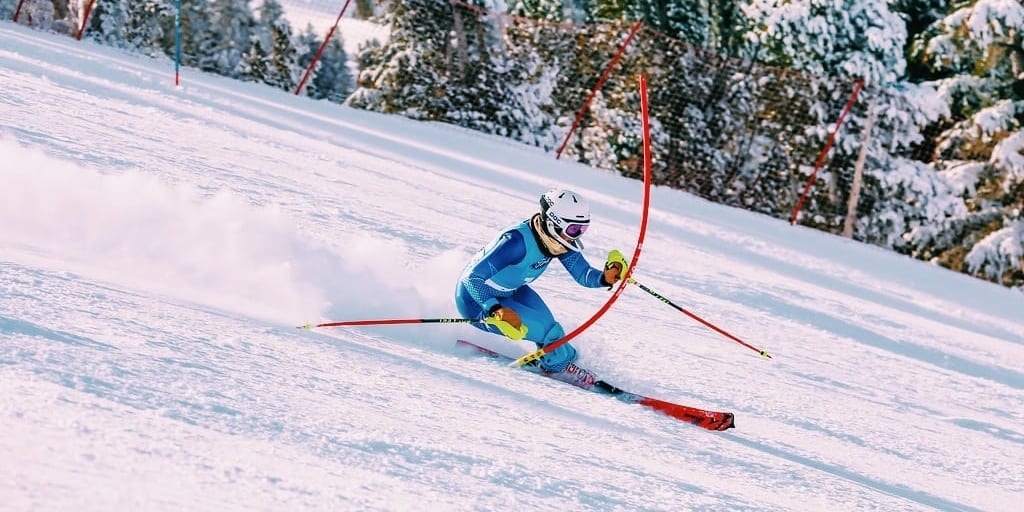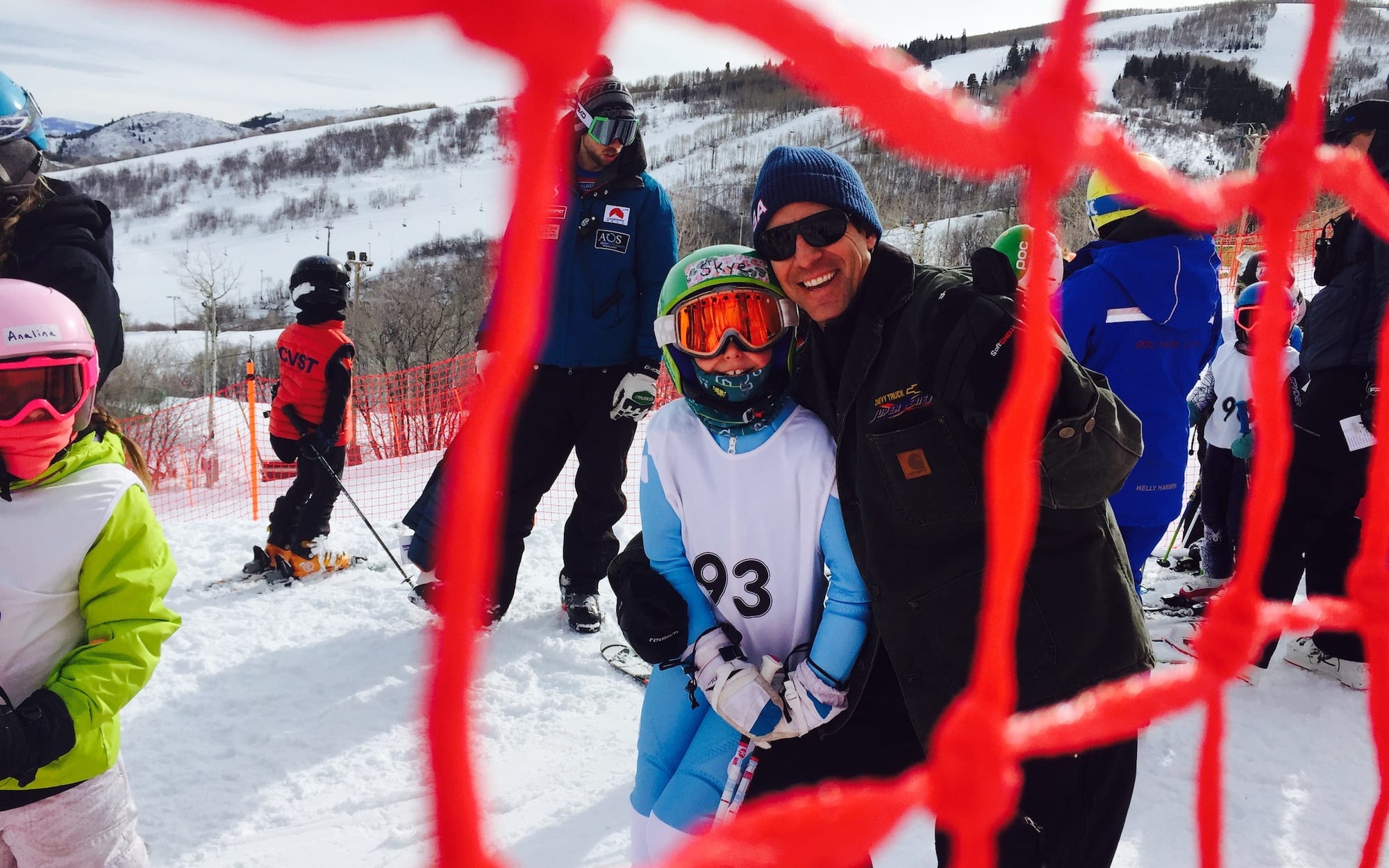Stacey Cook Reflects on 15-Year U.S. Ski Team Career

Her life on the mountain began at the age of four at the mighty Mammoth Mountain in California, but just last week, four-time Olympian Stacey Cook announced her retirement after 15 years with the U.S. Ski Team.
During her tenure with the Team, Cook or “Cookie” – as teammates called her – snagged nearly 250 FIS Alpine World Cup starts, 27 top 10 finishes in downhill and super-G disciplines, and three podiums – all second-place finishes in downhill, on her favorite track in Lake Louise, Canada. She was fourth in the overall downhill World Cup standings in 2013. She also earned 11th in downhill at the Vancouver Olympic Games, and two top 10 finishes at World Championships in 2009 and 2013, in Val d’Isere, France, and Schladming, Austria, respectively. However, it was December 6, 2014, that will be cemented in Cook’s memory. That day, of course, was the historic day that she and her teammates swept the podium at Lake Louise, Alberta – the first non-European podium sweep in the history of the sport.
“My fondest memory was when Lindsey, Julia and I swept the podium. I think – in their careers – that was a small item, but we grew up racing alongside each other, we are all the same age, and they were such stars of the sport and it was such a privilege to be alongside them every step of the way and to watch all of their success and that’s kind of the one piece of the puzzle where I really fit into their success,” Cook reflected. “We set history with that and it was the first non-European podium sweep and it was really cool, and something that we accomplished very much together. Obviously, result-wise that day, but also in pushing each other when we were little girls on the mountain. So that is something I am very proud of and will mean a lot to me well into the future.”
Cook is a part of the famous ’84 birth year club – a club that features teammates and Olympic champions Lindsey Vonn, Julia Mancuso, Ted Ligety, and World Cup standouts like Germany’s Felix Neureuther, France’s Adrien Theaux, Italy’s Christof Innerhofer, among others. That said, with such strong competition, it was no easy feat to reach the podium…and Cook showed her strength and perseverance, doing it three times at Lake Louise.
Lake Louise quickly became a favorite track for Cook – and it certainly showed. She was 10th and eighth in 2005, and fourth the following year – and it was 2012 that she took home her first podium on that track. That’s when she found her stride. Twice in the 2012 Lake Louise speed series, Cook was second in the downhill, behind Vonn. She attributes the North American success at Lake Louise to Americans having an advantage from the NorAm circuit. As younger ski racers, Cook and her teammates could race on that track before the Europeans, which was a huge advantage. She also thinks the track is a “real downhill” – perhaps one of the only on the circuit. Why?
“I really liked the speed on the course, it felt like a real downhill and I always thought it was cool that we basically had the same set as the men did,” Cook said. “There aren’t many venues like this – where men and women were on the same track with the same set. I just felt like it was a downhiller’s downhill and I was very comfortable with the speed and the slope and the terrain there. It’s incredibly beautiful there, which is – of course – inspiring when you’re standing in the start gate. The hotel was always fun with all the Christmas decorations and it’s your first time around all the other girls from the other countries. It was just a really uplifting vibe, and I think I was just buying into that energy. I went into Lake Louise with an open mind and without any sort of expectations because it was a new season, a brand-new opportunity, and your mind was just very clear and that’s definitely when I excelled as an athlete.”
What Cook truly holds closest to her heart, though, is the relationships built in this sport where you’re basically one big traveling international family. What was that like for Cook? “When you’re young you enter into the World Cup viewing everyone there as your hero, and then when you leave the World Cup, you look at everyone as your friend,” she noted. Who will she miss the most? Obviously, her American speed teammates and “Reusch Speed Unicorns” – fellow U.S. Ski Team alumna Leanne Smith, Alice McKennis, Laurenne Ross, and Jackie Wiles – but there are many others internationally.
“The Italians were always some of my favorites, and I think Verena Stuffer and Johanna “Hanna” Schnarf will be friends for life; they are so welcoming and caring and they have a passion for the sport that I think matches the Americans. I don’t know exactly where that comes from, maybe because it’s not the biggest sport in their nation kind of like here, but whenever we got to train with the Italians it was always some of the most fun experiences. Some of the older generation of the Swiss women’s ski team – I can’t name all of them, but that whole generation was just very dynamic and really kind of showed the power of team, because they were the top downhill team when I came into the circuit I looked up to a lot of them. They were my heroes. I really enjoy Sweden’s Frida Hansdotter; we were obviously on different circuits but whenever we saw each other she was just an electric personality that I really respect and always cheer for. On the men’s side too, there’s just so many nice humans.” Of everything Cook will miss in the sport, she will miss the people the most.
Humble as she is, Cook isn’t quick to acknowledge the fact that she was an integral part of the most successful women’s speed team in the world for much of the last decade. The 2013 season was a particularly special one for the American women, with every single member of the team landing on the podium at some point in the season. Additionally, in her final season with the team, the American women were the fastest downhill team in the world. Cook feels that inspiration came from former teammate Kirsten Clark.
“Kirsten Clark showed an example of being a good teammate to me and I learned a lot from her even though we only overlapped for three years, she was definitely an influence throughout my career,” Cook said. “I believe that we were the best speed team in the world the year that – I think it was 2006 – when she was around.”
“So, one of my first years on the World Cup, to my last year of the World Cup being the most successful women’s ski team in the world – it’s a feat that is not often recognized but we recognize as a team. You don’t get an award for it. It’s not something that we even got a round of applause for, to be honest, but we felt it as athletes,” she added. “That was special; to be a team and to be powerful on a world stage. You know, even with being the most dominant speed team, probably within the last decade – I would be interested to see the statistics on that – we always still felt like the underdogs.”
Being an underdog team in a European sport, largely based on European soil where North Americans live out of duffle bags traveling from one hotel to the next for four months straight and being the fastest in the world – that’s quite the accomplishment. “I think we had more fun in the process and being an underdog was one of the things that lead to our success,” she said.
Current women’s speed team head coach Chip White was the head coach in that special 2013 season, and Cook credits White’s guidance as a mainstay throughout her career for her success. Head women’s coach Alex Hoedlmoser, who is still a coach with the women’s speed team, is someone from whom she also learned a great deal.
“I just look back to that 2013 year when pieces fell into play for every single member on the team, to a level that none of us had ever really experienced before was so much fun. I will remember that feeling of being on top of the world longer than I’ll remember what results I accomplished. So that power of team when we made that click and when we felt it together is really really something special and something I’ll seek as I move into the future as well because it’s really fun to accomplish something bigger than you and something that you don’t necessarily think is possible and in the 2013 case, something that no one thought was possible.”
Cook would also like to thank her technicians, with whom athletes work very closely in their career – Primoz “Papi” Gregoric, Miha Dolinar and “Chief” – as well as women’s speed team assistant coach Karin Harjo. Harjo is the first woman to have set a World Cup slalom course in history. Cook said that “Harjo is the first female coach I had on the U.S. Ski Team and is definitely talented and has become a friend.”
Finally, Cook would like to thank her sponsors. “I want to give a thanks to both Mammoth Mountain and Clif Bar. They have been my staple sponsors and companies that I both believe in and have been lucky to be a part of. You can’t do it without companies like that and to have them by my side has meant the world to me. I am grateful for their support and for allowing me to learn and grow in this amazing atmosphere.”
Cook often gives back to the next generation of ski racers, leading her “Chix on Stix” camps, and more, at Mammoth Mountain. She feels a great sense of satisfaction in passing on the knowledge she’s gained throughout the years and hopes to continue to do so. Her parting words?
“I had some great mentors that did that to me and provided me a platform to be able to participate in the sport at the highest level, and it would be a waste if I didn’t pass that on to the next generation. I wanted to excel so much personally, but when you give back that always felt so much better and that feeling lasted so much longer. Sharing your passion and your knowledge with others is very important, more important than any individual goal to me. I think that athletes can learn a lot about themselves, but also find great satisfaction by looking beyond their own goals and helping others. That’s a very important part of sport. I love looking at the little kids I coach and seeing their raw passion. They are unaffected by the pressure of high-level sports and they are in it just because they want to be there and that is contagious, and would remind me on my worst days of why I was out there. It’s definitely not a glamorous sport, so if you can find some of the heart to give back to others and show them the good and what they can gain in life by pushing through the hard times and not always having fun in every circumstance, then they are going to be well ahead of their peers and it’s very rewarding to experience that take on them.”
This piece was originally published on U.S. Ski & Snowboard’s website.
–

































[fbcomments scheme=”light” title=”WHAT DO YOU THINK?”]